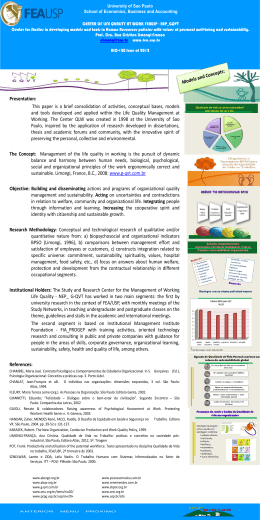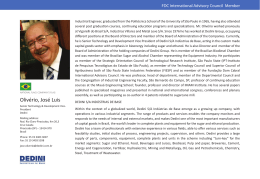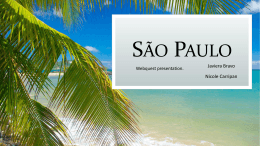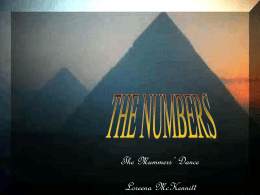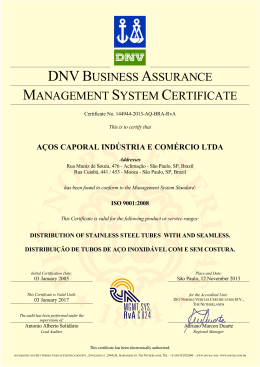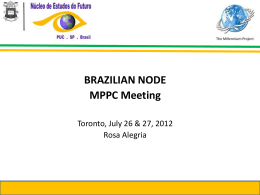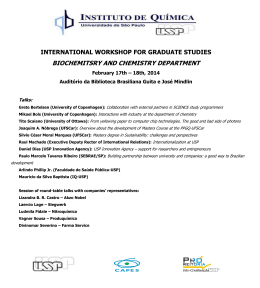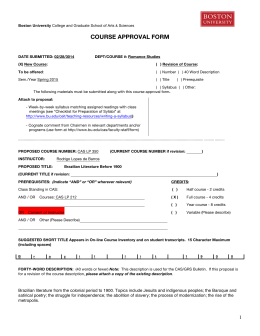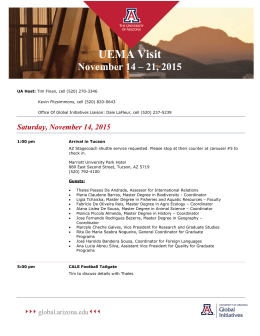2011 1 2 “T he activities of an Institute of Advanced Studies bear the charm of innovation, non-conventionality and, in the case of the University of São Paulo Institute, also a connection with social problems toward which the sciences are always tempted to make a contribution. Institutes of Advanced Studies represent a special place in a university, a place to carry out the conceptual experimentation required to advance any kind of knowledge, where the forgathering of perspectives is not a rare event but the very matrix that engenders new ideas. Far from paths already trodden (isn’t this almost a definition of exploration?), they offer special freedom to explore, and an understanding that the fields of knowledge, arts and ethics do come together in possible syntheses. The Institute of Advanced Studies of the University of São Paulo (IEA-USP) is an active and varied institution, a meeting-point of discovery and reflection, a galvanizer of interfaces, hospitable, in constant interaction and involvement with other sectors of the university, sensitive to social issues, to what is best and to what is fair, concerned with excellence, interested in expanding its networking with other similar institutes and other institutions of society, aware of the internationality that is increasingly becoming the backdrop of science and culture, but centered nevertheless in its own context. It is an honor to the Institute its 25 years of existence that open the field to many other achievements, which we may strategically anticipate and plan for. Welcome to IEA-USP.” César Ades, late director of IEA-USP — “Estudos Avançados” journal nº 73. 3 RESEARCH GROUPS Life and Natural Sciences 4 Life and Natural Sciences • SÃO PAULO Environmental Sciences Dedicated to studies that give weight to the adoption of solutions consistent with sustainable development, and to analyses of topics such as strategic environmental assessment, water governance, climate change, risk prevention and management, health and environment, social inclusion × exclusion, energy × food, and environmental justice. Coordinator: Wagner Costa Ribeiro – [email protected] Ecosystem Services Integrates researchers, groups and institutions to implement a national network that supports the use and conservation of pollinators, whether in research, education or agricultural production. Coordinator: Vera Lucia Imperatriz Fonseca – [email protected] The Ever-Changing Amazonia: History and Challenges Researches and debates the complex environmental and sociocultural diversity, and the institutional conditions of the Amazonian sub-regions that are undergoing deep economic and environmental changes. Unconventional Nuclear Astrophysics Coordinator: Maritta Koch-Weser – [email protected] Discusses the various aspects of the nuclear evolution of stars, particularly when unstable nuclei are involved. Also studies the nuclear evolution of binary stars such as Eta Carinae. Logic and Theory of Science Coordinator: Mahir Saleh Hussein – [email protected] Dedicated to the foundations of logic, mathematics and physics, mathematical aspects of paraconsistent systems, paraconsistent logics and artificial intelligence, and paraconsistent artificial neural networks and applications. Coordinator: Jair Minoro Abe – [email protected] 5 Life and Natural Sciences • SÃO CARLOS HUB Complex Systems Studies and illustrates in different levels various aspects associated with complex behavior in chemical, physical, biological, social and technological systems. Coordinator: Hamilton Varela – [email protected] Information Technology Provides support for scientific dissemination to the National Science and Technology Institute for Critical Embedded Systems (INCT-SEC) of the National Council for Scientific and Technological Development (CNPq), with assistance from the São Paulo Research Foundation (Fapesp). Coordinator: José Carlos Maldonado – [email protected] Organic Semiconductors Is a channel for scientific dissemination of the National Institute of Organic Electronics (Ineo) of the National Council for Scientific and Technological Development (CNPq), with assistance from the São Paulo Research Foundation (Fapesp). Coordinator: Roberto Mendonça de Faria – [email protected] Bionanotechnology Discusses works that deal with the interaction of nanoparticles and biological cells. Coordinator: Sérgio Mascarenhas – [email protected] Agricultural Instrumentation Holds academic events on the development of tools for agriculture, animal husbandry and agribusiness. Coordinator: Luis Henrique Capparelli Mattoso – [email protected] Public Science Communication for Education Helps to maintain a news agency and the site Science Web (www.cienciaweb.com.br), both dedicated to disseminating science and technology among teachers and elementary school students. Coordinator: Yvonne Mascarenhas – [email protected] Space Aeronautics Organizes public events on Space Aeronautics for teachers and students of aeronautical engineering. Coordinator: Fernando Martini Catalano – [email protected] 6 Human and Social Sciences 7 Human and Social Sciences • SÃO PAULO Intercultural Dialogues A platform to discuss national identity, ethnic/racial identity, cultural identity, otherness, gender, intergroup relations, prejudice/discrimination, ethics/violence, cultural a esthetics, perception, multiculturalism, and bilingualism. Social and Environmental Psychology Coordinator: Sylvia Duarte Dantas – [email protected] Studies the following aspects of the urban environment: hegemonic urban settings and urban development in the periphery, the spatialization and stratification of identity, excluding social inclusion, the culture of scarcity, poverty, and consumerism. Current Issues in Education Coordinator: Eda Tassara - [email protected] Addresses issues of education policy, with initial emphasis on elementary public education, contributing to expand theoretical reflection and insert it in discussions of broader issues, e.g., education and democracy, quality of teaching, educational projects and reforms, teacher training, evaluation, and distance learning. Public Policies, Territoriality and Society Coordinator: Maria Helena Souza Patto – [email protected] Aims to study the policies of territorial cohesion, territorial dynamics, relationships between environment and development, and contemporary social movements. Nutrition and Poverty Coordinator: Neli Aparecida de Mello Théry – [email protected] Analyzes national programs and policies concerning nutrition and poverty in Brazil. Also seeks to bring together scholars and government experts to stimulate dialogue and integration between them. Coordinator: Ana Lydia Sawaya – [email protected] 8 Some of the Observatory members at work Innovation and Competitiveness Observatory This group seeks to find new ways to encourage innovation in businesses and universities, enhancing the quality of the debate through the economics of knowledge and adding different views of the processes of innovation, R&D and stimulus to Brazilian competitiveness. Coordinator: Mario Salerno – [email protected] Literature and Culture Dedicated to discussing some key aspects of aesthetics, and of cultural and literary criticism: historicism, hermeneutics, phenomenology, critical theory and cultural studies. Coordinator: Alfredo Bosi – [email protected] 9 Philosophy, History, Sociology of Science and Technology Studies the importance of technoscience and its impact on processes and on the institutionalization of scientific research, as well as key aspects of the historical development of technoscience. Coordinator: Pablo Rubén Mariconda – [email protected] UNESCO Chair on Education for Peace, Human Rights, Democracy, and Tolerance Discusses issues related to human rights, such as torture and human rights in Brazil. Coordinator: Sérgio Adorno - [email protected] Bernardo O’Higgins Chair Aims to establish collaboration between the Clinical Psychology departments of the Institute of Psychology at the University of São Paulo and of the La Frontera University (Ufro), in Chile. Coordinators: (USP) André Eduardo Aguirre Antúnez – [email protected]; (Ufro) Patricia Santibáñez Fernández – [email protected] Brazil-France Research Hub Studies the impact of relations between Brazil and France in the formation and development of Brazilian culture. Coordinator: Gilberto Pinheiro Passos – [email protected] Human and Social Sciences • SÃO CARLOS HUB Education and Environment Works with the Public Science Communication for Education Research Group to organize events on environmental education. Coordinator: José Galizia Tundisi – [email protected] University and Businesses Enterprises Holds events on this issue with the participation of researchers, students and representatives from private companies. Coordinator: João Fernando Gomes de Oliveira – [email protected] Innovation and Technological Prospecting Network for Agribusinesses Maintains a nationwide network of technological information pertaining to agribusinesses. Coordinators: Silvio Crestana – [email protected]; Paul Cruvinel – [email protected] 10 INTERGRouPS After the meetings of research group coordinators in 2009 and 2010 (photo), IEA-USP organized in November 2011 the I Intergroups Workshop. At the convention, the coordinators presented their research topics and the main achievements of their groups, set out plans for upcoming work, and discussed manners of cooperation between the groups. 11 debate SERIES • Pre-Salt Oil Prospecting at the University of São Paulo (2009 and 2010) Organized by the Graduate Program on Energy (PPGE) of the University of São Paulo, sponsored by Petrobras and with support from IEA-USP, Polytechnic School (Poli), Institute of Electrotechnics and Energy (IEE), School of Economics, Management and Accounting (FEA), Oceanographic Institute (IO), Institute of Geosciences (IGc), and the University of São Paulo Foundation. Coordinated by Ildo Luis Sauer, from IEE-USP. • The Elderly in Brazil: Current Situation and Challenges (2010 and 2011) A serie at IEA-USP coordinated by David Braga Jr., from Grupo Mais of Premier Hospital, covering numerous topics, including: Physiology and pathophysiology of aging; Models of attention and organization of service networks and lines of care; Funding, structure, processes and impacts; Training and professional development; Information systems; Work, income, social security, and welfare; Entrepreneurship; Leisure, entertainment, culture and art. • Journalism, Freedom and Human Rights (2011) Coordinated by Dennis de Oliveira and Eugênio Bucci, from USP’s School of Communication and Arts (ECA), and by Ivo Herzog, from the Vladimir Herzog Institute, covering the following topics: The 1970s: Vladimir Herzog and his pioneer experience of independent journalism in a public institution; Human rights, freedom of expression and freedom of the press in Brazil; Feminism, human rights and journalism; and The role of journalism against the various forms of authoritarianism. • Innovation and Competitiveness A permanent cycle with weekly seminars organized by the Innovation and Competitiveness Observatory, with the participation of researchers, graduate students and representatives from private companies and government agencies. • Five Centuries of French Presence in Brazil (2009) Organized by the Brazil-France Research Hub, with the participation of French and Brazilian lecturers. This cycle was part of the official “Year of France in Brazil” program. 12 Neuroscientist Roberto Lent, from UFRJ, was one of the speakers of the Advanced Science lecture series. Advanced Science (2011) The Advanced Science lecture series celebrated the 25th anniversary of IEA-USP and was coordinated by César Ades and Luiz Roberto Giorgetti de Britto, director and deputy director of the Institute, respectively. The first series of the cycle (which will continue in the coming years) included the following conferences: • Computing with Neural Populations — Miguel Nicolelis (Duke University, USA) • Black Holes: Seeds or Cemeteries of Galaxies? — João E. Steiner (IAG-USP) • The Emergence of Syllables in Oral Language: Ontogenesis or Phylogenesis? — Eleonora Cavalcanti Albano (Unicamp) • Genetic Structure and Formation of the Brazilian People — Sérgio Danilo Pena (UFMG) • How Many Neurons Do You Have? Reviewing Some Dogmas of Neuroscience — Roberto Lent (UFRJ) • Animal Communication and Human Language — Didier Demolin (Brussels University, Belgium, and IP-USP) • Psychological Insights in the History of Brazilian Culture — Marina Massimi (FFCLRP-USP). 13 FOREIGN LECTURERS (2010-2011) •CANADa — Andrew Feenberg (Simon Fraser University). •CUBA — Luís Bartolomé Lecha Estela (Central University “Marta Abreu” de las Villas). •F RANce — Bernard Lahire (University of Lyon), Gérard Israël (writer) Jean-François Tourrand (Center for International Cooperation in Agronomic Research for Development), Jean-Pierre Goubert (School of Higher Studies in Social Sciences), Laurent Vidal (University of La Rochelle), Ludivine Eloy (National Center of Scientific Research), Patrice Duran (Institute of Advanced Studies of Paris), Stéphanie Nasuti (University of Paris 3), Vicent Fourcassié (Paul Sabatier University) e Zaki Laïdi (Center for European Studies of the Paris Institute of Political Sciences). •iNDIA — Vinod Vyasulu (Institute for Social and Economic Change). •ITaly — Marina Calloni (University of Milan-Bicocca). •JAPan — Kiyoto Tanno (Tokyo University). •MeXICO — Martha Schteingart (Mexico College) e Rosío Vargas Suárez (Autonomous University of Mexico). •netherlands — Andrei Cechin (University of Wageningen). •PORTUGAL — Antonio Nóvoa (Lisbon University). •sweden — Thomas B. Johansson (Lund University). •united kingdom — George Rousseau (University of Oxford), Sandrine Lage (Cranfield University), Stephen Dow (Dundee University), Peter Burke (University of Cambridge). •united stateS — Carlos A. Bertulani (Texas A&M University-Commerce), Hugh Lacey (Swarthmore College), Kuruvill Joseph Abraham (Case Western Reserve University), John W. Wenzel (University of Ohio), Roberto Abadie (New York University), Robert Trivers (Rutgers University), Stuart Shieber (Harvard University), Susan Kaufman Purcell (University of Miami) e Nayan Chanda (Yale University). 14 EVENTS IEA-USP organizes events that aim to integrate perspectives and give rise to new ideas, both in the sciences and in public policies: conferences, seminars, roundtables, workshops, symposia and colloquia open to the academic community and the general public, many of these in partnership with other institutions. The video recordings of these events can be watched at the Online Media Library of the Institute’s website. 10000 5000 4320 3500 2050 1000 130 100 382 335 320 132 140 118 62 TOTAL Events 450 researchers 10 1,169 attendees 1 14,870 2008 Events 2009 researchers 2010 2011 attendees 15 courses • History and Philosophy of Science (2008) Organized by the Research Group on the Philosophy, History and Sociology of Science and Technology, given by Fernando Tula Molina, from the National University of Quilmes (Argentina). • First US-Brazil Minicourse on Biofuels (2009) An initiative of IEA-USP and the Biofuels Network of the US-Brazil Council on Higher Education, with support from Fapesp’s Bioenergy Research Program (Bioen). Sponsored by CNPq and coordinated by the Fulbright Commission in Brazil. • São Paulo School of Advanced Studies in Phonic Dynamics (2010) An initiative of IEA-USP and the Institute of Language Studies (IEL) at Unicamp. Coordinated by Eleanor Albano, from IEL-Unicamp, with sponsorship from Fapesp and support from CNPq. The school boasted the participation of Brazilian and foreign teachers, and had students from many countries. • Discovering Amazonia and Discovering Oneself as a Reporter (2009/2010/2011) A course for students of Journalism set up by IEA-USP, Oboré Special Projects in Communication and Arts, the Army Social Communication Center, and the Air Force Social Communication Center, with support from other institutions. Coordinated by Peter Ortiz, from USP and Cásper Líbero Foundation. • History of the Brazilian Landscape (2011) A postgraduate discipline of USP’s School of Architecture and Urbanism (FAU), coordinated by José Pedro de Oliveira Costa, Martin Gegner and Maria José Feitosa, from FAU-USP. The main topic was Amazonian landscapes. • Clinical Psychology (2011) Taught at La Frontera University (UFRO), Chile, by Andrés Eduardo Aguirre Antunez, coordinator of the Bernardo O’Higgins chair at IEA-USP. As part of the exchange program, Eugenia Vinet and Francisca Roman, from Ufro, gave a brief course at USP’s Department of Clinical Psychology. 16 HUBS in OTHERs cities Ribeirão Preto The Ribeirão Preto Hub, at USP´s campus in this city, opened on November 2009 and organized a series of conferences during its first two years. The first research groups began to be defined by late 2011. The Ribeirão Preto Hub will organize both extended and brief activities. Long duration actions will feature workgroups and chairs for visiting professors; among those of short duration will be seminars, conferences and workshops, for instance. Topics that are already part of programs of the Ribeirão Preto campus will benefit from the existence of the Hub as an enhanced forum for debate and reflection. These topics include agribusiness, regional development, education, environmental problems, transport/ traffic problems, public and family health, and health technology, among others. Inauguration of the Ribeirão Preto Hub São Carlos An initiative of physicist Sérgio Mascarenhas, its first coordinator, the São Carlos Hub, at USP´s campus in this city, was created in 1997 and operates in partnership with the city’s research institutions (USP, UFSCar – Federal University of São Carlos and Embrapa – Brazilian Agricultural Research Corporation), the Technology Park, business incubators, high-tech industries, and public elementary schools. The Hub currently has ten research groups: Complex Systems, Information Technology, Organic Semiconductors, Bionanotechnology, Agricultural Instrumentation, Public Science Communication for Education, Space Aeronautics, Innovation Network, Technological Prospecting for Agribusinesses, Education and Environment, and University and Businesses Enterprises. 17 “Estudos Avançados” Journal “Estudos Avançados” is part of the Scientific Electronic Library Online (SciELO, www.scielo.br) and its articles receive an annual average of 2.6 million hits, making it one of the most consulted journals in that electronic library. “Estudos Avançados” publishes full dossiers and miscellaneous articles. Recent dossiers have addressed topics such as biotechnology, social and environmental theories, epidemics, water, humanities, National Congress, international crisis, Cuba, São Paulo, and nation/nationalism. Issue 73 (September-December/2011) brings the dossier “Institutes of Advanced Studies: Science and Society,” celebrating the 25th anniversary of IEA-USP. Since 2007, the journal offers a digital version in English, also published at SciELO, with selected articles from the Portuguese version. 18 BOOKS • Environment •Public policies, mitigation and adaptation to climate change in South America (IEA, 2009). •Waterlat network international conference – the tension between environmental and social justice in Latin America: the case of water management (IEA, 2010). •Polinizadores no Brasil: contribuições e perspectivas para a biodiversidade, uso sustentável, conservação e serviços ambientais [Pollinators in Brazil: contributions and prospects for biodiversity, sustainable use, conservation, and environmental services] (IEA, 2011). • Innovation and Competitiveness •Trajetórias recentes do desenvolvimento [Recent trajectories of development] (Observatório de inovação e competitivdade and Ipea, 2009). •Estratégias de inovação de sete países [Innovation strategies from seven countries] (Série cadernos da indústria) [Industry workbooks series], ABDI, 2010). •Estudos de jovens pesquisadores brasileiros [Studies by young brazilian researchers] – vols. I and II (Editora Papagaio, 2010). • Physics •Obra científica de Mario Schönberg [The scientific work of Mario Schönberg] – vol. I (Edusp, 2009). • Nutrition •Desnutrição, pobreza e sofrimento psíquico [Malnutrition, poverty and psychological suffering] (Edusp, 2011). 19 IEA-USP participated in the conference that brought together directors of 32 university-based institutes of advanced studies from 19 countries on October 2010, in Freiburg, Germany, hosted by the Institute for Advanced Study at the University of Freiburg. 20 INTERNATIONAL INITIATIVES GLOBAL MEETING OF INSTITUTES FOR ADVANCED STUDY IN GERMANY (2010) — IEA-USP attended the conference of university-based institutes for advanced study (Ubias) from every continent organized by the Institute for Advanced Study at the University of Freiburg, Germany. The purpose of the meeting was to discuss the expectations, challenges and new frontiers of this type of institution, and to outline the creation of an international network of kindred organizations. In this international milieu, IEA-USP also attended the conference “Social Sciences and Humanities Meet the Changing World: Challenges, Opportunities and New Frontiers”, organized by the Institute for Advanced Study in Social Sciences at Fudan University, Shanghai, China. IEA-USP will also be present at the next international meetings of Ubias, to be held in India, March 2012. WATERLAT RESEARCH NETWORK (2010) — A network devoted to governance and citizenship in water management and environmental health, with a focus on Latin America. Among its members are representatives from the Environmental Sciences Research Group. SAINT-HILAIRE PROGRAM (2010) — An initiative of the French Embassy to expand studies on contemporary Brazil, and research and training in Social Sciences. IEA-USP participated in drafting the project and hosted the first annual meeting of the program. INTERNATIONAL COOPERATION IN PSYCHOLOGY IN LATIN AMERICA (2011) — Coordinated by Agnaldo Garcia, from Federal University of Espírito Santo, the project will analyze the scientific cooperation in psychology among Latin Americans scholars. SÃO PAULO-MeXICO city (2011) — IEA-USP and Colegio de México jointly began comparative urban studies of the two Latin American metropolises. The work will be coordinated by Martha Schteingart, from Colegio de México, and Camila D’Ottaviano, from the School of Architecture and Urbanism (FAU), USP. 21 Directors of Brazilian Institutes for Advanced Studies: (from left) Ricardo Caldas (Ceam-UnB), Guilhermo Juan Creus (Ilea-UFRGS), César Ades (IEA-USP), Pedro Paulo Funari (Ceav-Unicamp), and Maurício Loureiro (Ieat-UFMG). Brazilian Institutes for Advanced Studies In the second half of 2011, IEA-USP organized the forum “Advanced Studies and the University,” attended by directors from the Center of Advanced Multidisciplinary Studies at University of Brasília, the Institute of Advanced Transdisciplinary Studies at Federal University of Minas Gerais, the Latin American Institute of Advanced Studies at Federal University of Rio Grande do Sul, and the Center of Advanced Studies at Unicamp. The meeting will produce a document on the current status of the institutes and their medium- and long-term prospects. Another important meeting that IEA-USP participated was the seminar organized by the Center of Advanced Studies at Unicamp in March 2011. The event was attended by directors Peter Goddard, of the Institute for Advanced Study in Princeton (USA); Iris F. Litt, of the Center of Advanced Studies in Behavioral Sciences at Stanford University (USA); and Eliezer Rabinovici, of the Institute of Advanced Studies in Jerusalem (Israel) – three of the leading advanced studies bodies in the world. Participants debated indications on courses to follow, mistakes to avoid, and challenges and ways to overcome them. 22 Partnerships From 2008 to 2011, in addition to partnerships with several units of the University of São Paulo, with other universities, and with research institutions from Brazil and abroad, IEA-USP also developed dozens of activities with other partners, including: Brazilian Academy of Sciences; SBPC – Brazilian Society for Scientific Development; CNPq – National Council of Technological and Scientific Development; Capes – National Coordination for the Improvement of Higher Education Personnel; Fapesp – São Paulo Research Foundation; Academy of Sciences of the State of São Paulo; Brazilian Physics Society; International Institute of Neuroscience of Natal; National Association of Human Rights, Research and Postgraduate Studies; Konrad Adenauer Foundation; Bunge Foundation; Brazilian Association of Agricultural Reform; CNRS; Russian Academy of Sciences; WWF; French Embassy; Consulate of India; Folha de S.Paulo newspaper; Editora Senac; Editora Record; Cultura bookstore; Vladimir Herzog Institute; Oboré Special Projects in Communication and Arts; Premier Hospital; Woodrow Wilson International Center for Scholars; David Rockefeller Center for Latin American Studies at Harvard; Prospectiva consulting firm; Brazilian Agency for Industrial Development; Brazilian Army; and Brazilian Air Force. New charter and goals The new IEA-USP charter, in effect since 2009, introduced a major institutional innovation, namely, official guidelines to create IEA hubs in other USP campuses in the state of São Paulo. In addition to specifying the goals and structure of the Institute, and the scope of its Governing Council and Board, the new charter also defines categories of researchers (visiting professors, collaborative professors, visiting researchers) and their responsibilities, and establishes criteria to create and run research groups and chairs. On January 2009, IEA-USP introduced a Goal Plan for the 2009-11 triennium, setting out objectives and actions for its various activities and needs, including efforts to develop a project to build the Institute’s head office, improvement of physical and personnel infrastructure, expansion of activities to other USP campuses, the diversification of forms of knowledge production, improvement of communication services, and increased fundraising. 23 24 COMMUNICATION Website The website of IEA-USP (www.iea.usp.br), developed by the Communication Division, is the main source of information on the Institute’s activities. The site contains news, a calendar of public events, issues of the electronic newsletter, articles and books by researchers, research groups and guest lecturers, information on the issues of the “Estudos Avançados” journal, and videos. A new website will be launched in mid 2012 that will provide new services, such as the IEA Electronic Bookshelf, with articles and other texts by researchers. Media Library All events held at the Institute are broadcast live over the web. After editing, the video recordings of these events are included in the Online Media Library at the IEA-USP website, where they can be watched at any time by anyone. The collection already gathers 430 videos of lectures, seminars, courses, and other activities. “Contato,” newsletter Another product of the Division is the biweekly newsletter “Contato,” containing information on the Institute’s ongoing projects and a calendar of public activities. The newsletter is sent by e-mail to registered subscribers, which currently number 12,000. Other web services, including Facebook and Twitter, are used as well to convey news involving the Institute. Image Bank The Division is also responsible for the photographic record of the activities of the Institute. The Image Bank contains over 3,000 digital photographs, which will be indexed and made accessible through the Institute’s website. Services for Journalists Journalists seeking sources for articles and stories, or who wish to cover the activities of the Institute, are welcome to contact the Division. 25 MEMBERS OF RESEARCH GROUPS A Adriana Capuano de Oliveira Alessandro Soares da Silva Ana Lúcia Pastore Schritzmeyer Ana Maria Blanques Anna Peliano Antonio Dimas de Moraes Antônio Mauro Saraiva Augusto Massi Aziz Ab’Saber B Belisário dos Santos Jr. Beto Ricardo Bruno Pagnoccheschi C Camila D’Otavianno Carlota Boto Célio Bermann Celso de Rui Beisiegel Cilaine Alves Cunha Cláudio Oller Nascimento D Demétrio Toledo Dina Lida Kinoshita Diógenes Alves Dora Ann Lange Canhos E Elaine Pedreira Rabinovich Eliana Heiko Matushima Eliezer Batista Eneas Salati Erwin Torralbo Gimenez F Fábio de Souza Andrade Fabio Feldmann 26 Federico Croci Fernando Paixão Flavia I. Schilling G Gabriela Pellegrino Soares Gisela Maria Bernardes Solymos Glória Carneiro do Amaral Guilherme Leite da Silva Dias Guilherme Melo Gustavo Martineli Massola H Hector Omar Ardans-Bonifacino Helena B. C. Pereira Helena Ribeiro Heliana Angotti-Salgueiro Hélio Guimarães Hervé Théry Hugh Lacey I Ima Celia Guimarães Vieira Israel Klabin Ivan Marques J João Inácio da Silva Filho João Roberto Gomes de Faria Joel Sigolo José Álvaro Moisés José Gregori José Miguel Wisnik José Oswaldo Soares de Oliveira José Roberto Machado Cunha da Silva José Sérgio Fonseca de Carvalho K Koichi Mori L Lafayette de Moraes Laura Parente Leyla Perrone Moisés Ligia Fonseca Ferreira Lilia B. Schraiber Lúcio Kowarick Luis E. Sanchez Luis Gylvan Meira Filho Luiz Caseiro M Manoel Cabral de Castro Marcelo Knorich Zuffo Marcos Mazzari Marcos Sorrentino Margarida Genevois Maria Carolina de Oliveira Maria Cecilia Loschiavo Maria Clara Di Pierro Maria de Lourdes Davies Freitas Maria Luiza Guarnieri Atik Maria Machado Malta Campos Mariângela Belfiore Wanderley Marta Kawano Martha Schteingart Maura Pardini Bicudo Véras Mauricio de Carvalho Ramos Mauro Leonel Murilo Marcondes de Moura N Newton Carneiro Affonso da Costa O Oscar Cupani P Paulo Eduardo Artaxo Netto Paulo Nogueira Neto Pedro Garcez Ghirardi Pedro Jacobi Pedro Leite da Silva Dias Philip Fearnside R Regina Campos Ricardo Mussea Roberto Smeraldi Rui Gomes Braga Neto Russel Mittermeier S Sandra Margarida Nitrini Sandra Maria Patrício Vichietti Semíramis Martins Álvares Domene Sonia Maria Flores Gianesella Suzana Pasternak Sylvia Gemignani Garcia Sylvio Barros Sawaya T Tercio Ambrizzi Thomas Lovejoy V Vanessa Louise Batista Virgilio Mauricio Viana Viviana Bosi W Wanderely Messias da Costa Y Yara Vicentini Yudith Rosenbaum Z Zil Miranda University of São Paulo President João Grandino Rodas Vice-President Helio Nogueira da Cruz BOARD Director ACADEMIC AREA Academic Assistant Marilda Gifalli Mauro Bellesa Deputy Director Social Communication Analysts Communication Analyst Luiz Roberto Giorgetti de Britto RIBEIRÃO PRETO HUB Coordinator Cláudia Regina Tavares Sandra Sedini Inês Iwashita Rafael Borsanelli Oswaldo Baffa Filho Secretary Deputy Coordinator Marisa Macedo César Ades Executive Provost for Management Antonio Roque Dechen Executive Provost for International Relations Adnei Melges de Andrade Institute of Advanced Studies GOVERNING COUNCIL César Ades Euclides Ayres de Castilho João Palermo Neto José Renato Nalini Luiz Roberto Giorgetti de Britto Oswaldo Baffa Filho Renato Janine Ribeiro Roberto Mendonça Faria Ruby Rudy Arellano Silvio R. Salinas COMMUNICAtion DIVISION Head André Lucirton Costa ADMINISTRATIVE AREA Administrative Assistant SÃO CARLOS HUB Coordinator Tizuko Sakamoto Financial Sector Roberto Mendonça Faria Project Coordinator Ivete Zacatei dos Santos Sérgio Mascarenhas Legal Counsel Administrative Coordinator Yvonne Mascarenhas TEAM São Paulo BOARD Executive Secretary Maria de Fátima Costa Moreno Maria do Perpétuo Socorro do Carmo Administrative Technicians Marlene Signoretti Thalita Neves João Fernando da Silva José Carlos Flor Marcelo Rodrigues dos Santos Raimunda Rodrigues Pinheiro dos Santos Raimundo José da Silva Sandra Codo Audiovisual Technician Jorge Paulo Soares Documentation Technician Maria Leonor Calazans ESTUDOS AVANÇADOS JOURNAL Editor Alfredo Bosi Assistant Editor Dario Luis Borelli Editorial Secretary Marli Pedro Commercial Secretary Edilma Martins INFORMATION TECHNOLOGY SECTION Systems Analyst Aziz Salem Ribeirão Preto Communication Analyst João Henrique Rafael Jr. Administrative Technician Rafael Sica 2011 Text and editing: César Ades, Marilda Gifalli, Mauro Bellesa e Rafael Borsanelli English version by Carlos Malferrari Graphic Designer: Silvia Massaro Printing: Gráfica Vallilo Photos: pg. 2, Ecosystem Services Research Group; pg. 5, Anna-Lena Thamm/Photocase/Art: Sergio Almeida; pág. 18, Hans-Peter Trefzer; others, Mauro Bellesa São Carlos Academic Technician Rosemari Siqueira Secretary Lucia Elena Losapio Pereira 27 INSTITUTE OF ADVANCED STUDIES OF THE UNIVERSITY OF SÃO PAULO Rua Praça do Relógio, 109, Bloco K, 5º andar Cidade Universitária, São Paulo, SP P.O. Box 72.012, Postal Code 05508-970 Phones: 55 11 3091-3919 and 55 11 3091-3924 [email protected] — www.iea.usp.br
Download

